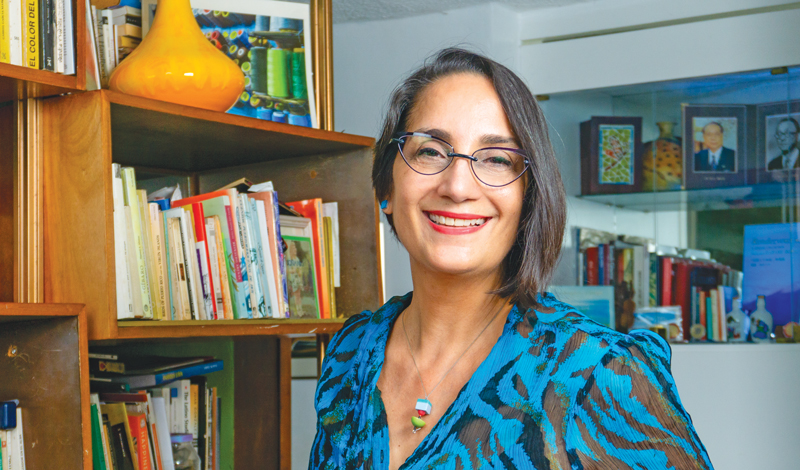Living Buddhism: Hello, Mónica. Thank you for speaking with us today. We understand you’ve taught literature and poetry for many years, but only in the last few have you begun to publish your own work. What inspired you to publish them now?
Mónica Lladó: You mean what took me so long! Yes, well, it’s a fair question, one that goes to the heart of my longest faith battle, which has to do with my voice—my battle to believe in my voice. I was born and raised in Fayetteville, New York, a tiny suburb of Syracuse, to parents who’d recently moved there from Puerto Rico. At home, I spoke only Spanish, and at school, only English. From a young age, I never felt fully at home anywhere I went.
How did this manifest in your daily life?
Mónica: Hmm. Like me looking at my shoes during roll call. When the teacher called my name, silence fell. When this first happened, on the first day of class, the girl beside me leaned over and put her hand on my ear to whisper, “What do you want to say?” It took a minute, but to my shoes, I said, just loud enough for them to hear: “Here.” For some months she became my voice and best friend. My primary outlet, however—the most reliable bridge between my thoughts and the world—was my pen. I don’t know when I started writing poems as such, but ever since I could write, my dreams, observations and scattered thoughts all found their way to paper. It was my way of getting it out—my voice.
When did you encounter Buddhism, and how did it change you?
Mónica: In the early ’90s, experiencing cycles of depression. My parents had moved back to Puerto Rico with me and my sisters when I was 10. I was in my 20s when I met José Daniel De Jesús, who we call Che, a musician, who explained Nam-myoho-renge-kyo to me as only a musician would—backward—beginning with kyo, meaning “sound.” I was in a phase of searching, looking into all kinds of spiritual practices and religions. But this one was the first that really gripped me. The fact that the enlightened self was something called forth from within, with one’s own voice, struck me. Chanting at my first meeting with so many others, from all walks of life, I felt a weight lift from my shoulders, a feeling I became familiar with each time I chanted. The weight was self-doubt, and the feeling freed when it lifted was confidence.
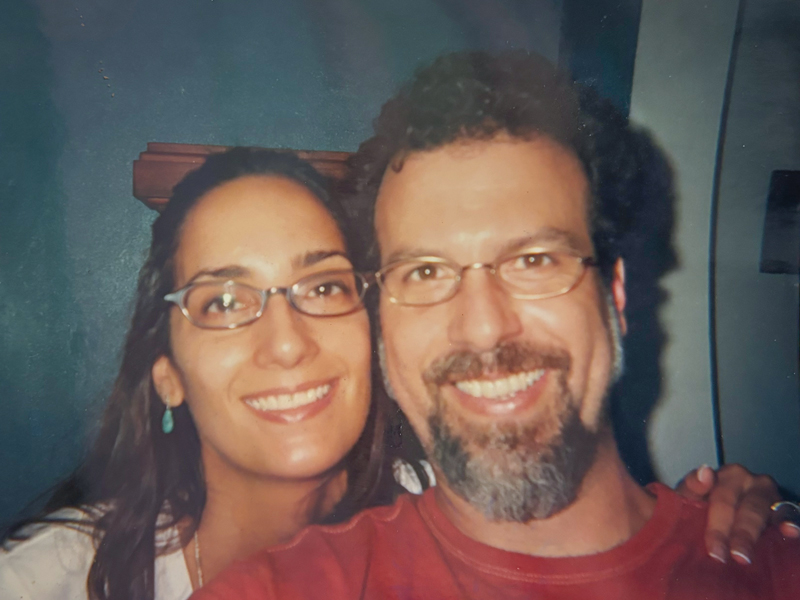
In time, you’d go on to become a professor of literature. But it wasn’t until 2018 that you published your first poetry collection. Why 2018, specifically?
Mónica: Three things, the first being Maria, the devastating hurricane that made landfall in Puerto Rico that September 20. Strength aside, the thing to understand about Maria: She didn’t want to leave! For what felt like an eternity, our apartment swayed like a boat on water, lashed by winds strong enough to force rain through closed windows and flood the apartment with two inches of water. When it was over, silence fell over the island. Outside, a strange scene met the eye. Puerto Rico is a green place, a tropical place. But now the trees and shrubs were bare, all stick and no leaf—the ground bald—a landscape closer to New York in winter than Puerto Rico any time of year. The silence was felt most in the evenings, usually alive with the calls of our native cotorra—little green parrots, a flock of which had always rounded our apartment at dusk, en route to nest in nearby Trujillo Alto Forest.
How was life altered after?
Mónica: Along with many trees, downed power lines were scattered along many roads. An island-wide blackout darkened the city, and dead telephone towers meant friends and family could not reach one another. Then there was the fear of uncertainty. We needed things—food, water, batteries, flashlights—but every store you walked into was empty.
Incredibly, my cell service remained very stable throughout the recovery. Using my voice as a bridge, the SGI-USA leadership team could keep in constant communication about the needs of our membership and the realities on the ground. As soon as the roads were clear, we set out to bring batteries, flashlights and water filters to the members, some of whom lived quite far—a five-hour roundtrip to visit those on the island’s west side. We brought these things, and also, a poem.
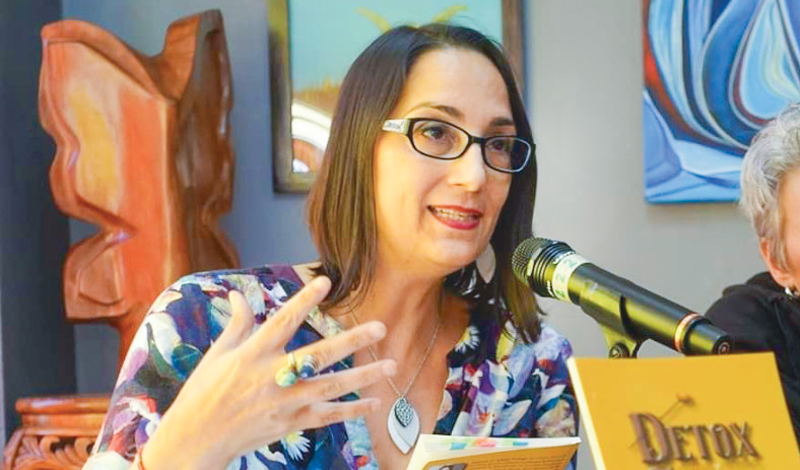
A poem?
Mónica: Yes, a poem Sensei had written in 2012, on his 84th birthday, received by the region team after the storm to encourage the members to remain undefeated. “Hope Is Life’s Treasure” is its title. A stanza reads:
A contributive life / of giving hope / to those who are suffering / is a source of growth, / fulfillment, / learning, / creativity / and solidarity.[1]
Early in the morning, we set out, and late at night came home, visiting as many people as we could in a day. Wow, were the members happy to see us! Wow, were they welcoming! I remember one Many Treasures Group member whose family lived on the opposite end of the island, who had stuck out the storm on her own, who greeted us beaming with joy. There were others who smiled with a touch of surprise, moved, it seems, that we had driven so far just to see them.
Though these morning road trips began early, I made sure to get up at an hour that allowed plenty of time to chant. At a time like this, I knew I had to bring with me more than flashlights. I had to bring the voice of hope. To each person, I was determined to convey my conviction that we would not only bounce back from devastation but emerge stronger than ever. My prayer was to show with my life actual proof of turning poison into medicine, karma into mission. In many ways, I was energized by the prayer pulled from the depths of my life by that storm, and by that poem. Responding to both drew forth hope, courage and vigor—food, as it happens, for poetry.
How?
Mónica: I mean I began to write! Poems—new poems—began to flow, free and steady.
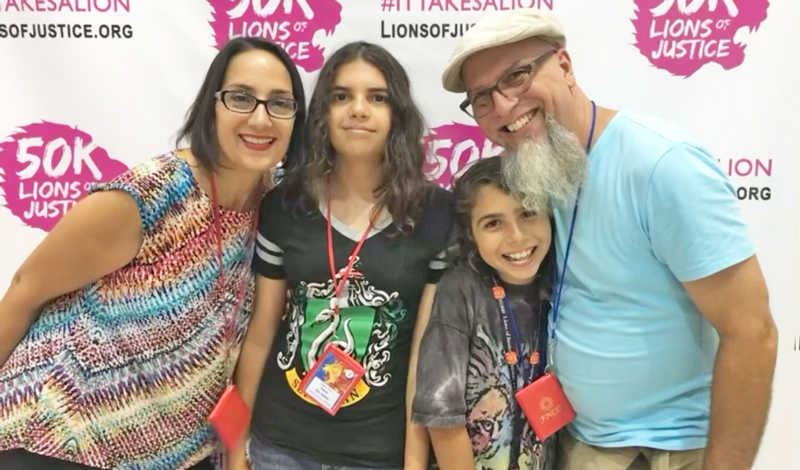
You mentioned that there were three things that roused your poetic spirit. What was the second?
Mónica: The second was the 50,000 Lions of Justice Festival. For the youth, for all of us, it gave us something to unite around, to strive toward together. When so many were looking to the future with skepticism, if not despair, I realized that I had a responsibility to them and myself to show actual proof. I wouldn’t inspire anyone by saying simply “go for your dreams” without going for mine. I put my poems together, found a publisher and published them.
Most memorable for me was the festival itself. As I said, Che’s a musician. He supported the youth in putting a band together for the festival. When they started out, they could hardly sound a note together—many were picking up instruments for the first time. But come the day of the festival, they were beautiful, playing a medley of traditional Puerto Rican songs—Comanchero and the like. They were shining, and it was clear that each had won over themselves and their circumstances. It made me deeply appreciate the wisdom behind each SGI campaign, which holds that it is by cherishing one’s dreams while advancing with others toward the fulfillment of those dreams that we generate massive momentum for everyone’s human revolution.
And the third?
Mónica: The third was the unexpected passing of my sister, Rosana, a week before the festival. We were close from the start. Born with Down syndrome, she showed me that being different was beautiful. She also taught me that chanting brings joy and benefit to all, even those who don’t know what it means. She loved to chant and brought such joy to my life. Her loss at such a crucial moment deepened my resolve to celebrate what makes me different, to develop my unique voice and encourage others to do the same. My first book of poetry, published that year, is essentially an ode to the Buddhist principle of turning poison into medicine.
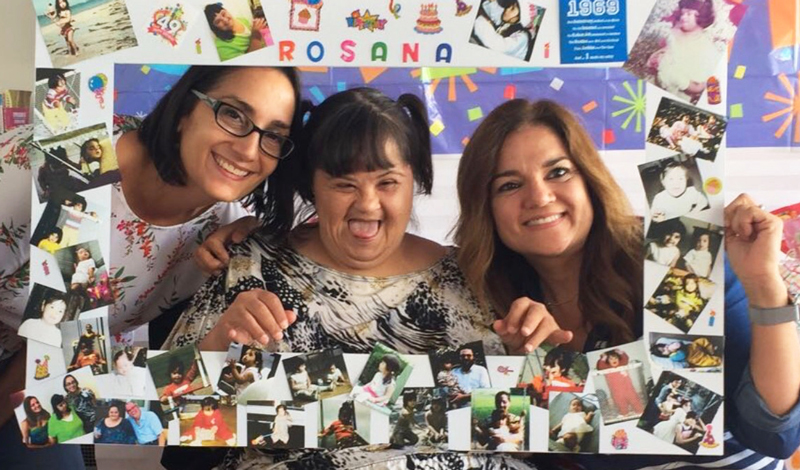
You have another collection coming down the pike. What is this one an ode to?
Mónica: To hope and peace, I’d say; to faith in myself and humanity—to kosen-rufu, when all is said and done.
In 2023, one of my literary mentors urged me to submit my poems to several competitions. At the time, SGI Puerto Rico had just launched an unprecedented seed-planting campaign. Inspired by determinations made by the members in Guam after Typhoon Mawar that May and the members of Hawaii after the Maui fires that August, we of Puerto Rico took on the same challenge: to introduce 1% of the population of our island to Nam-myoho-renge-kyo. We were challenging ourselves anew to confidently use our voices to create hope and peace.
Early this year, I received a message from organizers of the international competition, to be held in Puerto Rico, inviting me to present my work at the venue. Reflecting on my own surprise at the invitation, I realized that even after all these years, I still did not see myself as a poet. I realized it was time to challenge this deep-rooted doubt head-on. In April, we presented our poems to university students. I listened to poets from all over the world—powerful, deeply human poems read by women from the Dominican Republic, Iran, Palestine and Argentina. A friend of mine, a guest poet at the festival, asked me to submit my poetry book to his publishing house. I have never received such praise for my poetry—he not only offered to publish it but to help translate it, too! From Maria, and then from the pandemic, I felt I was emerging from the ashes stronger than ever.
What are some things you’ll never forget?
Mónica: First, I’ll never forget the return of the cotorras—the first green after the storm. They were not as many as they’d been, but we heard them all the same and rushed to the balcony, Che, myself and the kids. Survivors, I’ll never forget them, on their round about our apartment, heading for the forest—the island recalling itself.
Second, I’ll never forget the youth of Puerto Rico the day of the Lions of Justice Festival, responding to their mentor’s call to bring hope, not only to the members of the island, but to people all over the world.
Third, I’ll never forget my sister Rosana and the opportunity she gave me to deepen my faith and my sense of mission as a disciple of Sensei.
Even now, we’re rebuilding—from Maria and the storms that have followed—but my friends in faith and I have taken every challenge as a chance to get to know ourselves, one another and our neighbors more fully. Striving to fulfill our vow here in Puerto Rico, we’re planting seeds of trust no storm can wash away.
From the September 2024 Living Buddhism
References
- February 3, 2012, World Tribune, pp. 1, 8. ↩︎
You are reading {{ meterCount }} of {{ meterMax }} free premium articles

